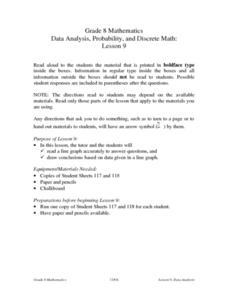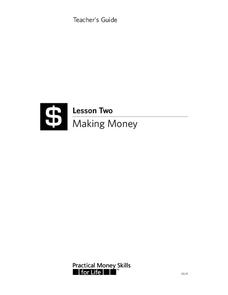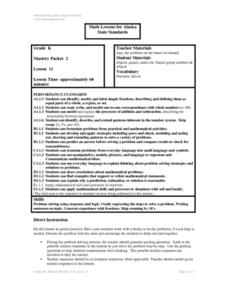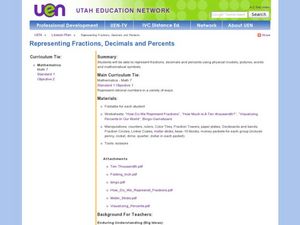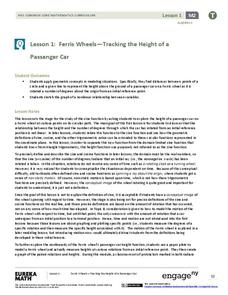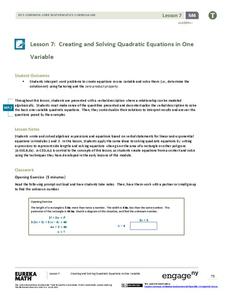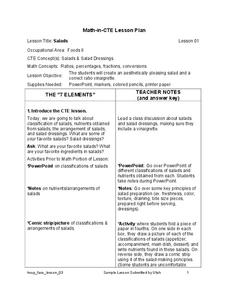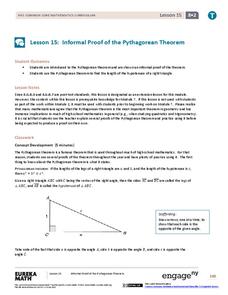Curated OER
Applied Maximum Minimum Problems
Students investigate the maximum and minimum of a graph as it related to cat food. In this calculus lesson, students analyze the amount of cat food a cat consumes, identifying the maximum and minimum amount. They graph their data and...
Curated OER
Math B Regents Questions by Performance Indicator: Logarithms
In this logarithms worksheet, students solve logarithm equations. They read story problems and find equivalent expressions to given logarithms. This three-page worksheet contains 13 problems. Answers are provided on the last page.
Curated OER
Data Analysis, Probability, and Discrete Math: Line Graphs
Eighth graders analyze data from line graphs. They discuss the purpose of line graphs, identify the parts of a line graph, answer questions about various graphs, and complete a worksheet. This lesson includes a script to teach along with.
Missouri Department of Elementary
Be a Problem Solving Star
Encourage scholars to problem solve everyday frustrations using the STAR method. Using the acronym, learners remember to stop, think, act, and review. Participants begin with a math analogy in which they problem-solve to find the correct...
Curated OER
The Sum of Our Integer Intelligences
Young mathematicians explore integers. They review adding integers through engaging in mathematical labs. Each lab station is designed to reflect one of the multiple intelligences. Resources for all activities are provided.
Visa
Making Money
From evaluating the current employment market to building a resume, pupils are introduced to the wide and varied elements of career planning.
Mathematics Assessment Project
Modeling Motion: Rolling Cups
Connect the size of a rolling cup to the size of circle it makes. Pupils view videos of cups of different sizes rolling in a circle. Using the videos and additional data, they attempt to determine a relationship between cup measurements...
Curated OER
Fraction Problem Solving Process
Help your charges solve a variety of fraction and skip counting problems using a problem solving process. As a class they work through a fraction problem step-by-step, and discuss a real-life connection to the problem. Students then play...
Curated OER
Two-Digit Subtraction With and Without Regrouping
Second graders subtract two-digit numbers. In this mathematics lesson, 2nd graders subtract both with and without regrouping. Students use manipulatives and place value mats to assist in problem solving.
Curated OER
Representing Fractions, Decimals, and Percents
In this fractions, decimals, and percents lessons, students explore various methods of representing fractions. They demonstrate situations that represent rational numbers. Students create a foldable exploring fractions, decimals and...
Curated OER
Drop it or not?
Students explore fractions. For this fraction lesson, students play an interactive game and use manipulatives to practice working with fractions.
EngageNY
Ferris Wheels—Tracking the Height of a Passenger Car
Watch your pupils go round and round as they explore periodic behavior. Learners graph the height of a Ferris wheel over time. They repeat the process with Ferris wheels of different diameters.
EngageNY
Modeling a Context from Data (part 2)
Forgive me, I regress. Building upon previous modeling activities, the class examines models using the regression function on a graphing calculator. They use the modeling process to interpret the context and to make predictions based...
EngageNY
Piecewise and Step Functions in Context
Looking for an application for step functions? This activity uses real data to examine piecewise step functions. Groups create a list of data from varying scenarios and create a model to use to make recommendations to increase revenue.
EngageNY
Choosing a Model
There's a function for that! Scholars examine real-world situations to determine which type of function would best model the data in the 23rd installment of a 35-part module. It involves considering the nature of the data in addition to...
EngageNY
Bean Counting
Why do I have to do bean counting if I'm not going to become an accountant? The 24th installment of a 35-part module has the class conducting experiments using beans to collect data. Learners use exponential functions to model this...
EngageNY
Creating and Solving Quadratic Equations in One Variable
Give your classes practice at modeling using quadratic models with a resource that uses area and integer problems to allow individuals to create second degree polynomials. Young mathematicians solve equations using factoring and then...
EngageNY
Graphing Quadratic Functions from Factored Form
How do you graph a quadratic function efficiently? Explore graphing quadratic functions by writing in intercept form with a lesson that makes a strong connection to the symmetry of the graph and its key features before individuals write...
Cornell University
Mechanical Properties of Gummy Worms
Learners won't have to squirm when asked the facts after completing an intriguing lab investigation! Hook young scholars on science by challenging them to verify Hooke's Law using a gummy worm. Measuring the length of the worm as they...
National Research Center for Career and Technical Education
Salads
Lettuce talk for a moment about your culinary scholars; do they have what it takes to create a great salad? Show them the finer points of salad preparation with a career and technology lesson plan that combines direct instruction,...
Agriculture in the Classroom
Farmland: GMOs and Organic Agriculture
Learn more about genetic modification, organic farming, and the role of biotechnology in agriculture by watching a documentary that shows how newly gained knowledge can be applied to specific situations involving farmers and the choices...
Serendip
Understanding and Predicting Changes in Population Size – Exponential and Logistic Population Growth Models vs. Complex Reality
Salmonella poisoning impacts over 200,000 people in the United States each year. Scholars learn about the growth of these bacteria using multiple approaches. Then they apply the same growth calculations to endangered species and think...
Federal Reserve Bank
Financial Fables: Shopping Wisely with Olivia Owl
Cover two subjects with one lesson! First, dive into English language arts; read an eBook, answer comprehension questions, and complete a cause and effect chart about the financial fable, Shopping Wisely with Olivia Owl. Then, take a...
EngageNY
Informal Proof of the Pythagorean Theorem
Prove the Pythagorean Theorem using multiple informal proofs. Scholars first develop an understanding of the origins of the Pythagorean Theorem through proofs. They round out the lesson by using the theorem to find missing side lengths...
Other popular searches
- Grade 9 Applied Math
- Applied Math Weight
- Applied Math Blueprint
- Applied Math 20
- Worksheets Applied Math
- Applied Mathematics
- Applied Math Parallel
- Applied Math Electricity
- Applied Math Exam
- Applied Math for Aviation
- Applied Math Store
- Applied Math Conservation




